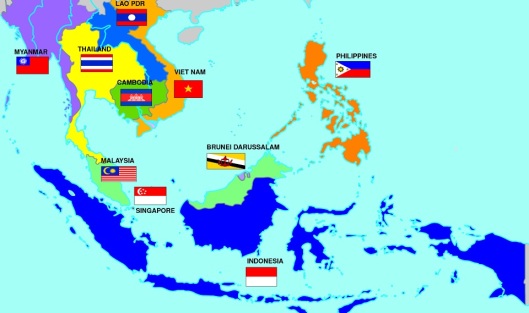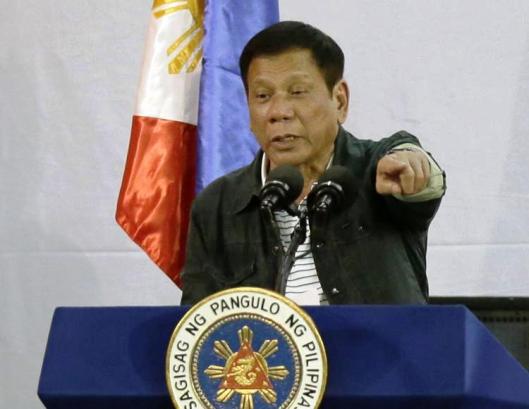By Wayne Madsen, Strategic Culture Foundation
The recent diplomatic row between the Philippines and the United States has come as a shock to U.S. State Department and Pentagon policy wonks but for astute observers of Southeast Asian politics, the decision of Philippines President Rodrigo Duterte to «pivot» to China and Russia was long in the making.
Ever since the so-called «Yellow Revolution» that saw Corazon Aquino replace the Philippines autocratic ruler Ferdinand Marcos, the majority of Filipinos have roiled under one corrupt American-blessed president after another.
Duterte, the fiery former mayor of Davao City in Mindanao, has channeled the disgust of many in the Philippines to adopt a hostile attitude in the face of a renewed U.S. military presence in Southeast Asia designed to counter China.
The 1986 «People Power Revolution», also known as the Yellow Revolution, was crafted by the United States as a way to ease President Ferdinand Marcos out of power. The revolution followed by three years the assassination of Senator Benigno «Ninoy» Aquino, who was shot to death by as was deplaning from his aircraft at Manila International Airport after returning to the Philippines from exile in the United States.
Marcos, who was blamed for the Aquino assassination, was forced out by the combined pressure of the Catholic Church, the pro-U.S. Philippines Armed Forces, and the U.S. Central Intelligence Agency.
Aquino’s widow, Corazon «Cory» Aquino, succeeded Marcos as president and what followed her were a series of corrupt and pro-U.S. presidents. General Fidel Ramos, a committed globalist, succeeded Mrs. Aquino as president and he, in turn, ensured the presidencies of his two successors, Joseph Estrada and Gloria Macapagal-Arroyo, both of whom were dogged by corruption scandals.
Macapagal-Arroyo was the daughter of America’s Cold War ally, President Diosdado Macapagal who served in office from 1961 to 1965 and saw troops from the Philippines committed to fight alongside American troops in the Vietnam War.
At the time of the committal of Philippines troops to the U.S. war effort in South Vietnam, the most outspoken opponent of the move was Macapagal’s political adversary, Ferdinand Marcos, something that is not lost on Duterte as he steers the Philippines away from Barack Obama’s military «pivot to Asia».
Macapagal-Arroyo was succeeded by another corruption-plagued president, Benigno «Noynoy» Aquino, the son of the assassinated Ninoy Aquino and Cory Aquino. The Philippines has been plagued by presidents from the same families serving in office, not much unlike what the United States has seen in recent decades.
Macapagal-Arroyo and Estrada were both impeached for corruption but only Estrada resigned from office. Duterte is the first fresh face to live in the Malacañang Palace in quite some time and the Philippines electorate gives him high marks for his plain-speaking persona.
Duterte has decided that the policies of his predecessors, who all sought close relations with Washington, is not in the best interest of the Philippines. Duterte has followed up on his independent foreign policy by inviting China and Russia to establish bases in the Philippines, canceling further U.S.-Philippines military exercises in the region, and calling President Barack Obama a «son of a whore».
Durtete also told the United States, «Do not treat us like a doormat because you’ll be… We aren’t ‘little brown brothers of America».
The Obama administration’s trouble with Duterte began after U.S. ambassador to the Philippines Philip Goldberg began interfering in the domestic affairs of the Philippines, including the election that propelled Duterte into office.
Goldberg has a history of involving himself in the affairs of countries where he is posted and he made no exception to this policy during the Philippines election campaign, in which he spoke out against Duterte.
In 2008, the Bolivian government of President Evo Morales expelled Goldberg, then the U.S. ambassador in La Paz, for stoking secessionist movements in four Bolivian provinces. In August of this year, Duterte called Goldberg a «’bakla’ son-of-a-bitch». «Bakla» is Tagalog for «gay».
With news of the death of the long-reigning King of Thailand, Bhumibol Adulyadej, who was born in Cambridge, Massachusetts and ensured that no Thai government veered too far from being allied with the United States, Thailand may follow the Philippines in a marked policy of independence from Washington.
Crown Prince Vajiralongkorn, the heir to the throne, is known to be close to former Prime Minister Thaksin Shinawatra and his sister, former Prime Minister Yingluck Shinawatra, both of whom were ousted in military coups engineered by the U.S. Central Intelligence Agency. Thaksin was overthrown in 2006 and Yingluck in 2014. Yingluck, who was accused of corruption by Thailand’s «anti-graft» agency, saw essentially the same «constitutional coup» treatment as meted out to Brazil’s President Dilma Rousseff, Honduran President Manuel Zelaya, and Paraguayan President Fernando Lugo.
Today, rather than use tanks and military juntas to overthrow leaders it does not like, the CIA relies on phalanxes of lawyers and judges, all controlled by the CIA, to bring about «constitutional coups».
This strategy has been a hallmark of the Obama administration and could be called the «Obama Doctrine».
Thaksin, who lives in exile in Cambodia, and Yingluck continue to enjoy wide support from the largely rural-based «Red Shirt» movement of Thailand. Vajiralongkorn is not popular with the loyal subjects of his father. In order to garner support for his reign, Vajiralongkorn may have to conclude a pact with not only Thaksin and Yingluck but also the Red Shirts, among whose ranks are a number of anti-monarchists. The Red Shirts are also opposed to American hegemony over Thailand and are suspected of receiving support from China. Just as the Obama Doctrine has not been lost on Duterte, it will not be lost on King Vajiralongkorn.
Like many of the past presidents of the Philippines, Thai prime ministers, since the end of World War II, have largely been approved by the CIA power brokers in Langley. Bhumibol succeeded to the throne on the death of his brother, King Ananda Mahidol.
At 9:00 am on June 9, 1946, Bhumibol visited his brother in his bedroom at the Royal Palace in Bangkok. At 9:20 am, a shot rang out from the king’s bedroom. Ananda was found lying face up in bed with a fatal gunshot wound to the head. The cause was determined to be accidental suicide caused by the young king playing with a loaded pistol.
The U.S. ambassador to Thailand was Edwin Stanton, Ironically, his namesake, Secretary of War Edwin Stanton, continues to be accused of involvement in the conspiracy to assassinate Abraham Lincoln.
Ambassador Stanton worked closely with the Japanese-appointed Regent of Thailand, Pridi Banomyong, who ruled the country during Ananda’s exile during World War II and who became prime minister after the war, to absolve Bhumibol and the United States and Britain of any involvement in the king’s death.
The British Viceroy of India, Lord Mountbatten, thought Ananda was a «pathetic» figure and not worthy of being a king. In any event, after Field Marshal Plaek Pibulsonggram, the pro-Japanese military leader of Thailand during the war, overthrew Prime Minister Pridi in 1947, the government charged two royal pages with the assassination of the king. Both of the pages were ultimately found guilty after a dubious trial and executed.
Stanton had successfully convinced Prime Minister Pridi that Communists disguised as students, Buddhist monks, journalists, and academicians were invading Thailand with the intent of overthrowing the monarchy. Stanton’s warnings were a ruse and none of the reports of Communist «infiltration» were true.
Many people in Thailand know that it was the pre-CIA Office of Strategic Services (OSS) that carried out the 1946 assassination of Ananda with the connivance of U.S. ambassador Stanton, U.S. chargé d’affaires Charles Yost, the British MI-6 station in Bangkok, and the OSS chief in Bangkok James «Jim» Thompson.
ambassador Stanton, U.S. chargé d’affaires Charles Yost, the British MI-6 station in Bangkok, and the OSS chief in Bangkok James «Jim» Thompson.
 ambassador Stanton, U.S. chargé d’affaires Charles Yost, the British MI-6 station in Bangkok, and the OSS chief in Bangkok James «Jim» Thompson.
ambassador Stanton, U.S. chargé d’affaires Charles Yost, the British MI-6 station in Bangkok, and the OSS chief in Bangkok James «Jim» Thompson.
After «officially» leaving the OSS, Thompson founded the Thai Silk Company, Ltd., which helped to revitalize Thailand’s war-ravaged silk industry. Thompson was also a notorious pedophile whose house guests in Bangkok always included a number of Thai and Burmese children. The house, itself, was adorned with a number of phallic statues. Authors Truman Capote; Somerset Maugham; and Margaret Landon, the author of Anna and the King of Siam, upon which the movie «The King and I» was based. were among Thompson’s famous guests in Bangkok. In 1967, Thompson, who knew where many of the CIA «skeletons» were buried throughout Southeast Asia, disappeared without a trace in the Cameron Highlands in Pahang, Malaya.
For seventy years, the Thai people have only been able to whisper about the events of 1946. With the king’s passing, there are several scores to be settled by Thailand with the United States, just as Duterte is currently settling past scores in the Philippines.
SOURCES: By Wayne Madsen, Strategic Culture Foundation Submitted by SyrianPatriots War Press Info Network at: https://syrianfreepress.wordpress.com/2016/10/18/usa-losing-grip/ ~River to Sea
 Uprooted Palestinian
Uprooted Palestinian
The views expressed in this article are the sole responsibility of the author and do not necessarily reflect those of the Blog!



No comments:
Post a Comment